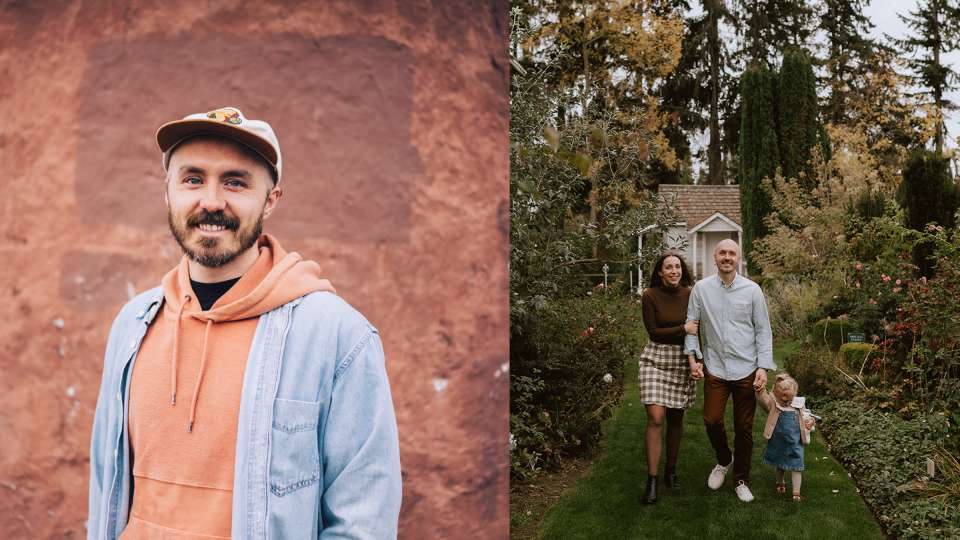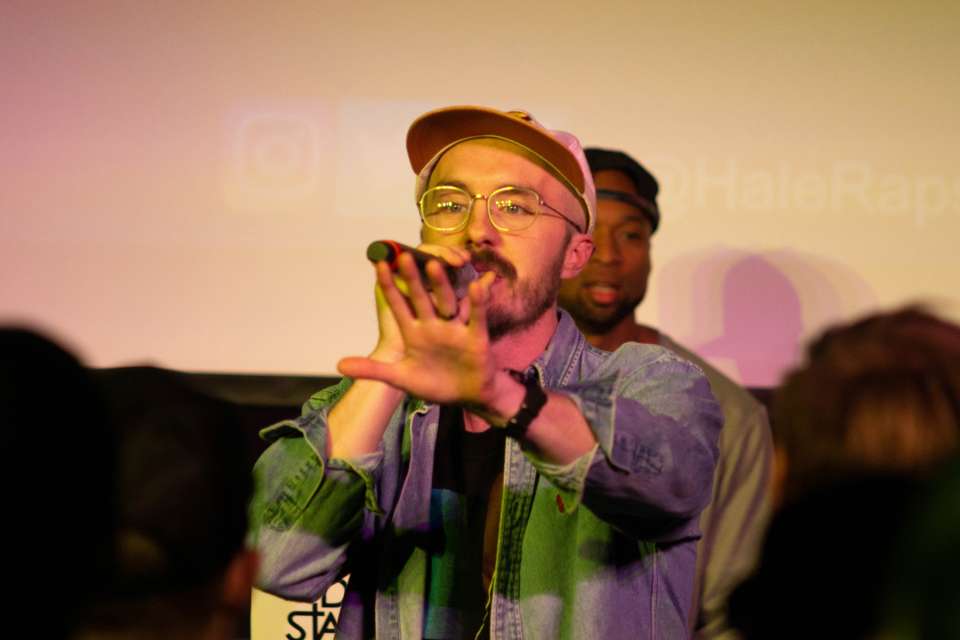
Anthony Hale is both the least lucky and luckiest man in the world. I mention this to him and he laughs, then grows thoughtful.
“I’m just super thankful and grateful to be alive,” he says.
This gratitude is because Hale has had not one, but two brushes — actually, more like collisions — with death.
The first was a life-altering diagnosis when he was 21. While his peers were finishing college and starting their careers, he was hospitalized, receiving chemotherapy and radiation for brain cancer.
The second was a freak accident last year. He was standing in front of his home when a stranger approached him — and stabbed him in the neck.
After all of that, it would be easy to give up or give in to fear. But he has a lot to live for: his wife, Kylie, and their daughter, plus a love of making music and a career in occupational therapy. His struggles could have defeated him — instead, he believes they saved him.
A life-changing diagnosis
It was 2010. Hale, a pre-law student at the time, was at his doctor’s office in Bremerton, Washington, hoping for answers. He’d been getting bad headaches almost every day and didn’t know why. His doctor told him he was probably dehydrated, so he went home and drank a bunch of water.
But the headaches kept coming, so he kept going back. He was told his desk was ergonomically incorrect, so he fixed it. No change. He was told he sat too close to his computer screen, so he adjusted his chair. No change. Then, he started getting double vision.
At last, he went to an optometrist. He says he’ll never forget the doctor’s reaction after examining his eyes.
“He was going, ‘Oh, wow.’ He said, ‘Hold on one second,’ and left, and I could hear him on the phone. He comes back in, writing frantically. He said he was writing all this down for me and that I needed to go to the ER right now and give them the paper,” Hale says.
When Hale arrived at the emergency department, they had a room waiting for him. An MRI revealed a tumor in his brain.
He was airlifted to Seattle. The next day, he had surgery to place a device, called a shunt, into his brain to help drain away the excess cerebrospinal fluid that had built up and put pressure on his brain.
He knew he’d need more surgeries, so he consulted with Dr. Richard Ellenbogen, a neurosurgeon at Harborview Medical Center who is an expert in treating brain cancers. Ellenbogen performed a brain biopsy to determine what kind of tumor Hale had, which would help him figure out how best to treat it.
The tumor was a germinoma, a rare cancerous tumor that is more common in boys and men younger than age 30. Germinomas are treatable, and there is a 90 percent survival rate for people who are treated.
Hale says he doesn’t remember anything for a while after the biopsy and was told he was in a semi-vegetative state. Awake but not very responsive, he couldn’t talk or do anything for himself. Then, he underwent his first round of chemotherapy and everything changed.
“That first day of chemo, I was told I sat up in the hospital bed and puked blood across the room, laid down and fell asleep. Then I woke up and I remember everything after that. Part of me wishes I wouldn’t have remembered all the chemo; it was one of the worst things I’ve experienced in my life,” he says.
Radiation therapy followed chemo. His treatment was so aggressive that Hale practically lived in the hospital for weeks; his schooling and other parts of his life screeched to a halt. His treatment worked, though, because his tumor shrank dramatically, then disappeared.
But his struggle wasn’t over.
Healing and finding faith
Radiation and chemo destroyed Hale’s tumor but also robbed him of the ability to express himself through language, a condition known as aphasia.
“When an MRI showed the cancer was gone, my whole family and I were elated. But on the way home from finding out I didn’t have cancer, when I was trying to express my excitement, I couldn’t talk or form a sentence,” he says.
He spent three months in occupational therapy re-learning how to talk and write.
Though his cancer went into remission, he still had to have a shunt. It failed on two separate occasions, causing dangerous fluid buildup in his brain. He had to be rushed to the hospital and underwent two more surgeries.
As soon as he could, Hale went back to school. He no longer felt that law was the right path for him, though. Working so closely with occupational therapists made him realize he wanted to help people the way he’d been helped. He applied and was accepted to the UW School of Medicine’s occupational therapy program, which he’s since graduated from.
As his career goals shifted, so did his core beliefs. He sought some kind of meaning for his suffering and everything his family had to endure as they watched him go through treatment.
“Cancer made me look at my entire life and the world 100 percent differently. I was struck with all of this wonder, ‘Why am I here? Why do I even exist? What’s the meaning of my life?’” he says.
Searching for answers, he educated himself about different religious beliefs. Something clicked. He found himself believing in God — and recognizing that, if not for cancer, he wouldn’t have found his faith. Or Kylie, his wife, whom he met through campus ministry.
“That’s why I say cancer is the best and worst thing that’s ever happened for me. I can’t imagine my life without it and what it’s led to,” he says.
Another setback
As unexpected as his cancer diagnosis was, Hale’s second brush with death was even more startling.
No one expects to be stabbed by a stranger in front of their apartment. Hale was just getting home from class when a man approached, asking for cigarettes. When Hale declined — he didn’t have any — the man lunged at him and stabbed him in the neck.
The initial impact also hit Hale in the head; he thought the man had simply shoved him. Then he noticed the blood. The man demanded Hale’s wallet, threatening to kill him. Hale complied but wondered if he was going to die anyway.
The man left. Kylie ran outside and pressed a towel against his neck to staunch the bleeding. Then she called 911.
“I thought, ‘This is it, I’m done, it’s over, after everything that’s happened I’m going to die from some guy randomly stabbing me,’” Hale says.
An ambulance whisked him to Harborview’s emergency department. Despite the trauma team’s expertise, Hale’s survival was nothing short of incredible. The knife had somehow avoided his jugular vein and carotid arteries — and his shunt.
“The doctors were like, ‘You should be dead, we shouldn’t be talking to you right now,” Hale says.
Police arrested the man shortly after the incident, according to Hale.
The experience profoundly changed him, he says. Though he physically recovered quickly, the incident still haunts him. Sometimes, he finds himself watching if someone is coming up behind him, and he’s warier of strangers.
He can’t know what the man was thinking, whether the man thought he was stealing something valuable. All Hale knows is his own struggle to reconcile his near-death experience over something as insignificant as a lack of cigarettes — and a wallet containing $7.

Cancer as both curse and gift
Trying to reconcile what happened to him has been part of Hale’s mental recovery from cancer, too. It’s what led him to record an album.
He wanted to share his story and needed a way to express everything he’d been through. Rap was a natural fit because he’d always been a fan of the genre.
Even though writing about his cancer journey brings to mind painful memories, he finds the process cathartic.
“The more time that passes, the more I can reflect on how much my experiences changed me and what they brought me. In that way, they become more real,” he says.
The unthinkable, however, had become a theme in Hale’s life, and this experience was no exception. After spending nearly two years recording his debut album “The Beacon” on weekends and between classes, a corrupted computer drive caused him to lose everything.
“Once again, I was like, ‘What in the world? What am I even doing with anything in my life?’” he says.
But he didn’t quit. He says he heard one question in his head, clearly, when he doubted his path: What’s changed? Nothing, he realized. So he recorded the album again. This time, the process was much smoother and faster.
He’s since recorded many singles and regularly performs live, and he’s already working on his next releases for this year.
His music plays on the duality that has come to define major events in his life: Devastation and fear, followed by resilience. In songs like “The Storm,” his lyrics don’t shy away from the pain and terror of his experiences, but also don’t let negative emotions overpower joy and gratitude: “I won’t glorify it / there’s nothing glorious about it / but I was looking for something / the storm’s the reason that I found it.”
Despite everything, Hale remains mostly optimistic. He’s grateful for his friends and family who have supported him through so much. He loves being married. And he loves being a dad: He and Kylie have a two-and-a-half-year-old daughter and will welcome a second daughter in June. They own a house now, and he’s settled into a new occupational therapy job.
He also hopes his story resonates with people and inspires them not to give up. And he dares to set goals, relying on the faith that has kept him going.
When I ask how he’s been doing recently, health-wise, he says he’s doing well.
“Praise God, everything’s been good, knock on wood, all the wood,” he says. “No more getting stabbed, no more brain cancer scares.” Then he laughs: “Although I do have some lower back problems because I’m getting old now.”
But it’s not really a complaint because, for Hale, having the opportunity to get old is a gift.
This article was originally published on December 13, 2018. It has been reviewed and updated with new info.

 Healthy ideas for your inbox
Healthy ideas for your inbox





